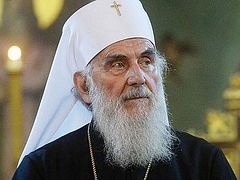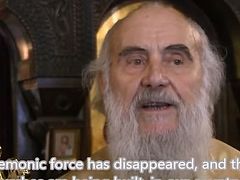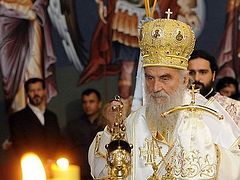The Orthodox Church recently bid farewell to the primate of the Local Serbian Church—His Holiness Patriarch Irinej. He was a first hierarch for whom all are equal before the face of the Lord, all are children of God, and all labor for the good of the Church.
Author and translator Svetlana Luganskaya remembers Patriarch Irinej and her communications with him.
 Patriarch Irinej and Svetlana Luganskaya
Patriarch Irinej and Svetlana Luganskaya
Deep faith, modesty, and unpretentiousness
In his eulogy, Metropolitan Porfirije (Perić) of Zagreb and Ljubljana said of the Patriarch:
He zealously served in love for God and His Church, and with the same love and sacrifice and with great modesty he served his people. In difficult circumstances, with the special wisdom of Tradition and great humility, he remained faithful to the most valuable thing that Serbian history preserves. The decisions he made as the Patriarch of Serbia were always deliberate, always in accordance with the teaching of the Church and the national ethos. I recall with great sadness the numerous meetings I had with him that are now a thing of the past; his life, and his main qualities which were deep faith, modesty, and unpretentiousness. He related to people with these qualities, whoever they were—patriarchs, bishops, state figures, and simple people—which allowed him to be very attentive and devoted to the problems of others. And this attentiveness allowed him to solve certain issues much easier than anyone else around him. In recent years, he dealt with the completion of the Church of St. Sava with the most fervent love. The image of this nearly-finished, beautiful cathedral, can be considered an icon of his ministry on the throne of the Serbian patriarchs.
We all hoped that the second news about the death of Patriarch Irinej would turn out to be false, but an official message from the Serbian Orthodox Church confirmed this sad news.
The Patriarchate of the Serbian Church, with its Cathedral of Archangel Michael, is located in the very heart of Belgrade, and you could often see that as His Holiness would walk to the cathedral to serve in the evening, people would approach him, ask his blessing, ask him questions, tell him something, and the archpastor would find a warm word for everyone.
I met Patriarch Irinej many times in various circumstances: at the famous Belgrade book fairs that he always visited, at presentations and festivals, after the services in all ends of the country, but the most vivid memory remains from a personal meeting with him, when I interviewed him for the book, People of the Serbian Church. We agreed on the meeting a few days in advance. He asked me to send the questions ahead of time, as the topic was an extensive account of his life and the history of the Serbian Church in the difficult years of the communist rule. It was with great excitement that I went to meet the Patriarch early in the morning. His secretary met me and led me to the second floor of the Patriarchate, where the Patriarch’s very modest chambers are located. He came in, collected and friendly, and a conversation began, which I would like to quote from, since very little is known about the personality of Patriarch Irinej and his life outside of Serbia.
Escape to monasticism, a ban on going to church, and monasticism as a condition for work
 The future Patriarch Irinej in his youth —I was born in a Christian family, traditionally religious. In those times, the time of my childhood, it was customary to keep the fasts, to go to church and receive Communion. And we celebrated our traditional Slava.
The future Patriarch Irinej in his youth —I was born in a Christian family, traditionally religious. In those times, the time of my childhood, it was customary to keep the fasts, to go to church and receive Communion. And we celebrated our traditional Slava.
I don’t remember my father very well. I was a young child when he died. My mother was deeply faithful woman; she was part of the Prayer Movement1 led by Vladyka Nikolai (Velimirović); and she went to the assemblies arranged in Žiča Monastery and other monasteries. This was the atmosphere of my childhood, and it had a strong influence on me; it was also very important that my native village was located near the ten Ovčar-Kablar monasteries, and we regularly went to church, to the restored Monastery of St. Jovan. This was my first introduction to the monastic life, to an understanding of the monastic life, the idea of which was born from my childhood and accompanied me in my youth.
I fell in love with the monastery very early. There was a holy man at St. Jovan Monastery, Fr. Makarije. I confessed to him in childhood and I was fascinated by this life, and one day, against the will of my mother (she was a widow), having left my studies, I went to go live in a monastery and remained there for a year. But later I already understood it myself, and one very educated monk whom I met there recommended that I continue my education, which I did after living in the monastery for a year.
 The future Patriarch Irinej of Serbia with his mother
The future Patriarch Irinej of Serbia with his mother
Thus, the decision to go to seminary wasn’t a problem for me. I graduated from high school, went to seminary, and then to the theological faculty of Belgrade University, and I can say that I had no serious problems connected with this decision.
—And later?
—Thank God, there were no big problems later either. I didn’t do anything to provoke the authorities. I was law-abiding, but I kept the Christian path and the Christian way of life.
—Did you serve in the army?
—The army treated me quite respectfully. Of course, the atheist ideology ruled in the army, and the first order I received was a ban on going to church. That was no surprise, but both the soldiers and officers respected me and would often ask me to speak with them—not for some provocations, but because they simply wanted to know something they didn’t know. They had obviously come from Christian families, so I had no problems in the army from this side.
After the army, I went to Belgrade and continued studying at law school and even started working. But when a seminary teacher in Prizren died I was advised to offer my candidacy. Out of obedience, I took part in this “competition,” and they took me on as an assistant lecturer. But, you know, I was given a condition: I had to be ordained. This came as a bit of a surprise for me. I had the thought of becoming a monk, but still I thought: If I get married, then I won’t be a priest—but I always had thoughts of becoming a monk, and I was tonsured and sent to Prizren as a monk.
Friendship with Patriarch Pavle
—How did you take the news that you would be consecrated a bishop?
—I didn’t expect it. At the time I was very busy organizing the seminary, restoring its buildings. I did this with love, and I was very glad for my work, my vocation. My election to the episcopacy was a surprise, but I accepted it with gratitude. For one year I was vicar to His Holiness, and then I became the bishop of Niš.
—In what state did you find the diocese?
—Vladyka Jovan was there. He was in the diocese for a long time—nearly forty years. He was a very hardworking, noble man. He became the bishop of Niš somewhere around 1933, and he did everything he could, but then the wartime came. It became very difficult, and he was already old, and he was replaced by Bishop Vasilije of Žiča. He filled in for three years and returned the good order to the diocese that had once been introduced by Bishop Jovan. Thus, I found myself in a fairly well-equipped diocese.
—Your Holiness, tell us about your friendship with Patriarch Pavle. Maybe there were some especially memorable moments?
—I met Patriarch Pavle when he was still a layman, during the year I was at Transfiguration Monastery. The monastery was very well organized, spiritually speaking, and there were two well-known spiritual fathers there—Fr. Vassian and Fr. Evstatije the Athonite. Fr. Vassian belonged to the Prayer Movement. He was a missionary and a preacher. The monastery was always full of pious people from all over Serbia, which gave me a sense of the strength of faith, the strength of the Church, and an awareness of their meaning in our lives. Patriarch Pavle, still Gojko Stojčević then, was in the neighboring Annunciation Monastery, so we’ve known each other since then. When it came time for me to go to seminary and I had to write a petition to the bishop, I went to see Gojko to help me write it.
Soon as a deacon he was appointed as a teacher at the seminary, so our communication continued there, and when I was appointed as a teacher, he was already Bishop of Prizren, so we were close for many years. He was a noble man, a man of his word, steadfast in his convictions; his word was unshakable and the position he held was always correct. He wouldn’t back down from it in under any circumstances. This aroused great respect for him amongst us youngsters. He was kind to everyone. He addressed us students formally, unlike the other teachers, and it as if elevated us in our own eyes and strengthened us. I can say I was on fairly close terms with him. Life brought us close together; his help was especially important when I was the acting rector. Our true friendship was born of all of this and continued later when I became a bishop, which was very precious to me. I always shared the position of Patriarch Pavle.
Patriarch by lot
—Your Holiness, what was your first thought or feeling when you found out you were elected Patriarch?
—I will take this opportunity to say that I never had the thought or desire to be Patriarch. I understood that it’s a very high place in the Church, a great responsibility and calling, which demands a great sacrifice, ministry, and mission, where you no longer belong to yourself and no longer live your own life, but the life and problems of the clergy, of the people—in the conditions you’re given—and the thought of becoming Patriarch never entered my mind. When discussions about this began, I didn’t think much of it.
After the death of Patriarch Pavle, elections began, and I found myself in the final round of three bishops: Metropolitan Amfilohije of Montenegro, Bishop Irinej of Bačka, and myself. I wanted to say thanks and then withdraw my candidacy, but several bishops convinced me not to, but rather to wait for the results of the election, because these three were chosen by the Council, and then one of the three bishops would be chosen by lot. I prayed to the Lord—I told the council about it—that this cup might pass from me, and gave myself over to the will of God. I prayed that the Lord would save me from this, but what happened happened.
 Greeting Metropolitan Amfilohije of Montenegro
Greeting Metropolitan Amfilohije of Montenegro
Yes, it is a high calling requiring great responsibility—before God, before the nation, before man. I placed my hope in God and in my brother hierarchs, because the Patriarch is but one among the members of the Council, the first among equals, and we all make up the Church; we all labor to do everything for the good of the Church and our people.




